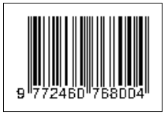Efisiensi Daya Pada Smartlock Bike-Sharing Berbasis LoRaWAN Dengan Metode GPS Duty Cycle
Alfian Andi Nugroho(1*), Ahmad Ashari(2)
(1) Program Studi Ilmu Komputer, FMIPA UGM, Yogyakarta
(2) Departemen Ilmu Komputer dan Elektronika, FMIPA UGM, Yogyakarta
(*) Corresponding Author
Abstract
Keywords
Full Text:
PDFReferences
[2] Z. Chen, D. V. Lierop, and D. Ettema, “Dockless bike-sharing systems: what are the implications?,” Transport Reviews, vol. 40, no. 3, pp. 333–353, 2020.
[3] U. Noreen, A. Bounceur and L. Clavier, "A study of LoRa low power and wide area network technology," 2017 International Conference on Advanced Technologies for Signal and Image Processing (ATSIP), Fez, 2017, pp. 1-6, doi: 10.1109/ATSIP.2017.8075570.
[4] X. Li, “FEASIBILITY OF DUTY CYCLING GPS RECEIVER FOR TRAJECTORY-BASED SERVICES,” The State University of New Jersey, 2014.
[5] Gaja Kochaniewicz, Smart lock for bike sharing in corporate environments, pp. 06-10, 2015
[6] F. A. Rachman, A. G. Putrada and M. Abdurohman, "Distributed Campus Bike Sharing System Based-on Internet of Things (IoT)," 2018 6th International Conference on Information and Communication Technology (ICoICT), Bandung, 2018, pp. 333-336, doi: 10.1109/ICoICT.2018.8528778.
[7] D. Croce, D. Garlisi, F. Giuliano, A. L. Valvo, S. Mangione, dan I. Tinnirello, “Performance of LoRa for Bike-Sharing Systems,” dalam 2019 AEIT International Conference of Electrical and Electronic Technologies for Automotive (AEIT AUTOMOTIVE), Torino, Italy, Jul 2019, hlm. 1–6, doi: 10.23919/EETA.2019.8804519.
[8] A. T. Nugraha, R. Wibowo, M. Suryanegara and N. Hayati, "An IoT-LoRa System for Tracking a Patient with a Mental Disorder: Correlation between Battery Capacity and Speed of Movement," 2018 7th International Conference on Computer and Communication Engineering (ICCCE), Kuala Lumpur, 2018, pp. 198-201, doi: 10.1109/ICCCE.2018.8539316.
[9] A. T. Nugraha, N. Hayati and M. Suryanegara, "The experimental trial of LoRa system for tracking and monitoring patient with mental disorder," 2018 International Conference on Signals and Systems (ICSigSys), Bali, 2018, pp. 191-196, doi: 10.1109/ICSIGSYS.2018.8372663.
[10] T. Hadwen, V. Smallbon, Q. Zhang, dan M. D’Souza, “Energy efficient LoRa GPS tracker for dementia patients,” dalam 2017 39th Annual International Conference of the IEEE Engineering in Medicine and Biology Society (EMBC), Seogwipo, Jul 2017, hlm. 771–774, doi: 10.1109/EMBC.2017.8036938.
Article Metrics
Refbacks
- There are currently no refbacks.
Copyright (c) 2021 IJEIS (Indonesian Journal of Electronics and Instrumentation Systems)

This work is licensed under a Creative Commons Attribution-ShareAlike 4.0 International License.
View My Stats1







